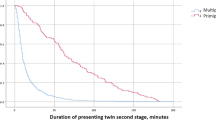Abstract
Purpose
To assess the effect of advanced maternal age on the obstetrics and neonatal outcome of twin pregnancies.
Methods
A retrospective study of 716 dichorionic–diamniotic twin pregnancies delivered at our institute. The study population was divided into two groups: women aged 35–39 years (group A, n = 142) and women aged ≥ 40 years (Group B, n = 48). The control group consisted of women younger than 35 years (group C, n = 516).
Results
The rate of cesarean section (CS) was significantly higher among women older than 35 years compared to the control group (A 76.8% and B 87.5% vs C 65.7%, P = 0.001). Women older than 35 years were also at higher risk for developing hypertensive disorders (A 7.0%, B 14.6%, vs C 5.4%, P = 0.04). On multivariate regression analysis, maternal age was found to be independently associated with a higher rate of CS (odds ratio vs reference group C: group A 1.6, 95% CI 1.08–2.6; group B 3.2, 95% CI 1.3–7.8). There was no difference between the groups in the rate of neonatal complications.
Conclusion
Women with twin pregnancy, older than 35 years, have a significantly higher rate of CS and hypertensive disorder. This rate increases with maternal age, with no increased rate of neonatal complications.

Similar content being viewed by others
References
Blondel B, Kaminski M (2002) Trends in the occurrence, determinants, and consequences of multiple births. Semin Perinatol 26(4):239–249
The American College of Obstetricians and Gynecologists (2014) Practice Bulletin No 144: Multifetal Gestations: Twin, Triplet, and Higher-Order Multifetal Pregnancies. Obstet Gynecol 123(5):1118–1132. https://doi.org/10.1097/01.AOG.0000446856.51061.3e
Martin JA, Hamilton BE, Osterman MJK (2012) Three decades of twin births in the United States, 1980–2009. NCHS Data Brief 80:1–8
Berkowitz GS, Skovron ML, Lapinski RH, Berkowitz RL (2017) Delayed childbearing and the outcome of pregnancy. N Engl J Med 322(10):659–664. http://www.ncbi.nlm.nih.gov/pubmed/2304491. Accessed 11 Aug 2017
Balasch J, Gratacós E (2017) Delayed childbearing. Curr Opin Obstet Gynecol 24(3):187–193. http://www.ncbi.nlm.nih.gov/pubmed/22450043. Accessed 11 Aug 2017
Cnattingius S, Forman MR, Berendes HW, Isotalo L (2017) Delayed childbearing and risk of adverse perinatal outcome. A population-based study. JAMA 268(7):886–890. http://www.ncbi.nlm.nih.gov/pubmed/1640617. Accessed 11 Aug 2017
Conde-Agudelo A, Belizán JM, Lindmark G (2017) Maternal morbidity and mortality associated with multiple gestations. Obstet Gynecol 95(6 Pt 1):899–904. http://www.ncbi.nlm.nih.gov/pubmed/10831988. Accessed 11 Aug 2017
Lisonkova S, Joseph KS, Bell R, Glinianaia SV (2017) Annals of epidemiology effect of advanced maternal age on perinatal outcomes in twins : the impact of chronicity. Ann Epidemiol 23(7):428–434. https://doi.org/10.1016/j.annepidem.2013.05.005
Barda G, Gluck O, Mizrachi Y, Bar J (2017) A comparison of maternal and perinatal outcome between in vitro fertilization and spontaneous dichorionic–diamniotic twin pregnancies. J Matern Neonatal Med 1–7. http://www.embase.com/search/results?subaction=viewrecord&from=export&id=L614071469%5Cnhttp://dx.doi.org/10.1080/14767058.2016.1270934%5Cnhttp://sfx.library.uu.nl/utrecht?sid=EMBASE&issn=14764954&id=doi:10.1080%2F14767058.2016.1270934&atitle=A+comparison+
Gerber RS, Fields JC, Fox NS, Barberio AL, Bodenlos K (2017) Outcomes of twin pregnancies in women 45 years of age or older. Obstet Gynecol 129(5):827–830
Suzuki S (2007) Obstetric outcomes in nulliparous women aged 35 and over with dichorionic twin pregnancy. Arch Gynecol Obstet 276:573–575
Xiromeritis PP (2006) Twin gestation in older women : antepartum, intrapartum complications, and perinatal outcomes. Arch Gynecol Obstet 273:293–297
American College of Obstetricians and Gynecologists (2017) Committee opinion no. 559. Obstet Gynecol 121(4):904–907. http://www.ncbi.nlm.nih.gov/pubmed/23635708. Accessed 11 Aug 2017
Salem S, Amalia Y (2011) A significant linear association exists between advanced maternal age and adverse perinatal outcome. Arch Gynecol Obstet 283:755–759
Sekhon LH, Gerber RS, Rebarber A, Saltzman DH, Klauser CK, Gupta S et al (2017) Effect of oocyte donation on pregnancy outcomes in in vitro fertilization twin gestations. Fertil Steril 101(5):1326–1330. http://www.ncbi.nlm.nih.gov/pubmed/24602755. Accessed 12 Aug 2017
Schimmel MS, Bromiker R, Hammerman C, Chertman L, Ioscovich A, Granovsky-Grisaru S et al (2017) The effects of maternal age and parity on maternal and neonatal outcome. Arch Gynecol Obstet 291(4):793–798. http://www.ncbi.nlm.nih.gov/pubmed/25227657. Accessed 11 Aug 2017
ACOG Committee on Obstetric Practice (2016) ACOG practice bulletin. Diagnosis and management of preeclampsia and eclampsia. Number 33, January 2002. American College of Obstetricians and Gynecologists. Int J Gynaecol Obstet 77(1):67–75. http://www.ncbi.nlm.nih.gov/pubmed/12094777. Accessed 9 Sep 2016
Kathiresan A, Roca L, Istwan N, Desch C, Cordova Y, Tudela F et al (2017) The influence of maternal age on pregnancy outcome in nulliparous women with twin gestation. Am J Perinatol 28(5):355–360. http://www.ncbi.nlm.nih.gov/pubmed/21136347. Accessed 12 Aug 2017
Mclennan AS, Gyamfi-bannerman C, Mph CVA, Wright JD, Ms ZS, Alton MED et al (2017) The role of maternal age in twin pregnancy outcomes. Am J Obstet Gynecol 217(1):80.e1–80.e8. https://doi.org/10.1016/j.ajog.2017.03.002
Funding
This study was not funded.
Author information
Authors and Affiliations
Contributions
OG: manuscript writing and project development. YM: data analysis and data collection. JB: data collection and project development. GB: project development and manuscript editing.
Corresponding author
Ethics declarations
Conflict of interest
The authors declare that they have no conflict of interest.
Ethical approval
All procedures performed in studies involving human participants were in accordance with the ethical standards of the institutional and/or national research committee and with the 1964 Helsinki declaration and its later amendments or comparable ethical standards.
Informed consent
For this type of study, formal consent is not required.
Human and animal rights statement
This article does not contain any studies with animals performed by any of the authors.
Rights and permissions
About this article
Cite this article
Gluck, O., Mizrachi, Y., Bar, J. et al. The impact of advanced maternal age on the outcome of twin pregnancies. Arch Gynecol Obstet 297, 891–895 (2018). https://doi.org/10.1007/s00404-018-4656-1
Received:
Accepted:
Published:
Issue Date:
DOI: https://doi.org/10.1007/s00404-018-4656-1




